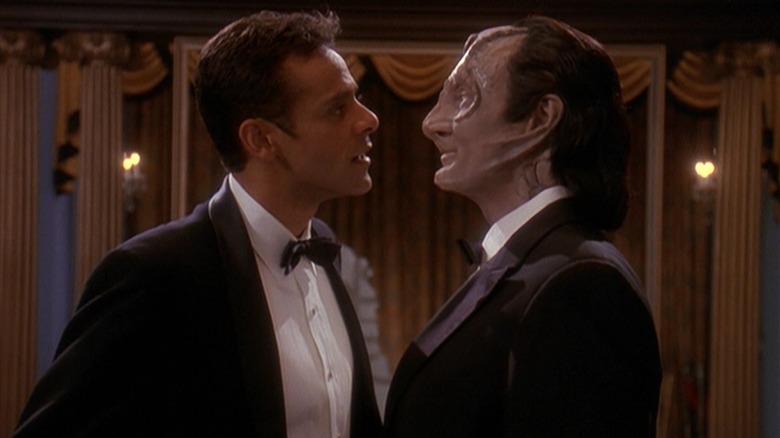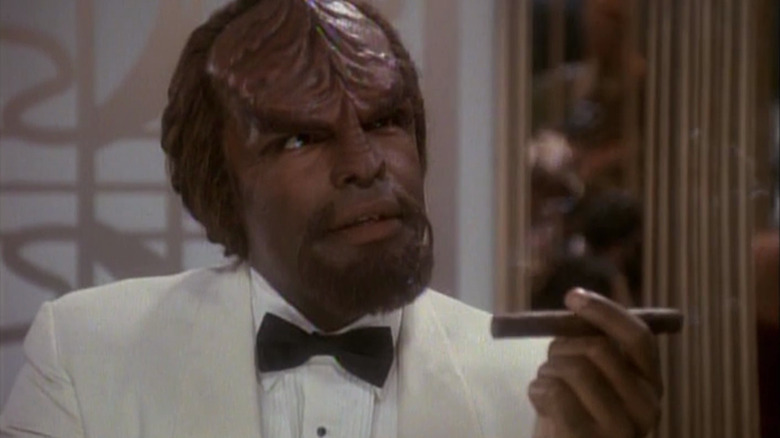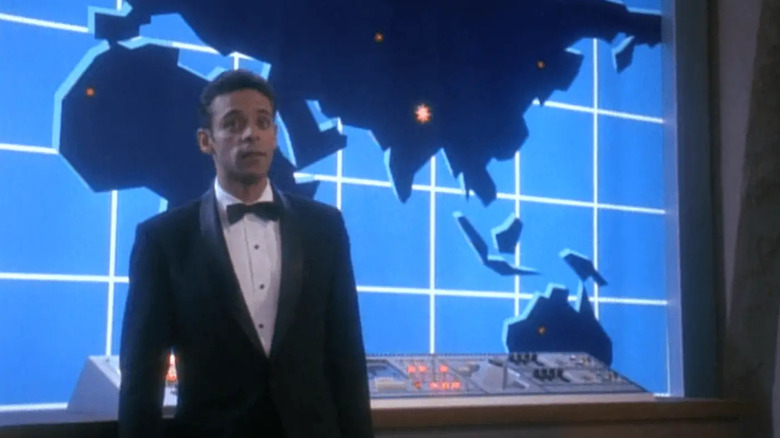One Star Trek: DS9 Episode Caused Trouble With Key James Bond Execs
In the 1995 "Star Trek: Deep Space Nine" episode "Our Man Bashir," the title character, Dr. Julian Bashir (Alexander Siddig), is in the station's holosuites, enacting a sexy, Ian Fleming-like spy story with his Cardassian paramour Garak (Andrew Robinson). Meanwhile, the rest of the station's senior staff are involved in a runabout accident, and they are beamed out of the explosion in the nick of time. The transporter, however, was also damaged, and the unique transporter patterns of the senior staff have to be stored in a secondary computer until it can be repaired. Perhaps predictably, the patterns end up in the same computer memory core that controls the holosuite, and the senior staff begin appearing — as holograms — in Bashir's spy adventure. If Bashir kills the holographic versions of his friends, their patterns will be deleted from the computer memory and they'll die.
The actual technical nitty-gritty doesn't matter to audiences quite as much as the fun concept of seeing "Deep Space Nine" characters dressed as spy novel characters. Lieutenant Dax (Terry Farrell) takes the place of a Bond Girl-like character named Honey Bare, while Worf (Michael Dorn) becomes a casino-dwelling spy contact named Duchamps. The villain in the holographic spy story, Dr. Hippocrates Noah, is "played" by Captain Sisko (Avery Brooks).
"Deep Space Nine" was a complex and heady series, often dealing with corrupt theocracies, reluctant spirituality, and the fog of war, so the "fun" episodes tend to stand out. "Our Man Bashir" is lighter on its feet than most episodes, and the cast is clearly having fun.
It seems, however, that MGM, the owners of James Bond, hated "Our Man Bashir." Screenwriter Ronald D. Moore recalled receiving an angry letter from the studio in a 2020 interview with The Hollywood Reporter.
Deep Space 009
According to the Hollywood Reporter article, "Our Man Bashir" was pitched by a freelance author named Robert Gillan (given a "story by" credit on the episode), but it was shot down as there had already been several episodes of "Star Trek: The Next Generation" about characters who are stuck in the fantasy world of a holodeck. Captain Picard (Patrick Stewart) was once trapped in a noir detective story (in "The Big Goodbye") and Data (Brent Spiner), while dressed as Sherlock Holmes, was pitted against an intelligent Moriarty (Daniel Davis) in "Elementary, My Dear Data." Trapping "Star Trek" characters in a James Bond story was initially dismissed as old hat. It was Gillan's idea to trap transporter patterns in a holosuite that won over producers.
Moore recalled loving the production, even if it took a while to film. His teleplay, he noted, went well out of its way to avoid explicit 007 references, relying instead on cliches of the genre. Moore wanted to pay homage to the James Bond movies he loved growing up but certainly wanted to stay away from anything that might be considered actionable. Despite his best efforts, MGM wrote an angry letter, noting that they weren't impressed. Moore said:
"MGM sent us a letter. [...] I don't recall the Broccolis being on it or having signed it, but I remember after the episode aired, the studio sent us a very stern letter. And it even got back to some of the higher-ups at Paramount. It seems [the 007 people were] not very flattered by our 'homage,' but it wasn't like we got in any serious trouble or anything."
The Broccolis are Albert Broccoli and his family, who produced and oversaw many James Bond film films.
Do you expect me to talk?
One might wonder, though, why MGM would object to a sci-fi send-up of James Bond when the franchised has been getting openly spoofed for decades; James Bond parodies are almost as old as James Bond himself. Heck, the 1967 film "Casino Royale" even used the James Bond name and direct iconography to satire the more over-sexed elements of a film franchise that was, at that point, only a few years old. What did "Our Man Bashir" do that was so objectionable?
It may have something to do with the ending of the episode. While in the holosuite, Dr. Bashir learns that the hardworking Deep Space Nine engineers are working tirelessly to extract his holographic compatriots and reconstitute them in the real world. In order for the engineers to complete their work, though, Bashir needs to extend his 007-like adventure as long as he can. The problem is that he's already reached the adventure's climactic scene wherein the supervillain is poised to destroy the world. In order to buy some time, Bashir announces to Dr. Noah that he's tired of being a hero and agrees with the villain's ideas that the world deserves to be destroyed. Indeed, Bashir even activates the villain's world-destroying machine and deliberately brings about the apocalypse.
This baffles Dr. Noah. "I didn't expect to win," he says.
It seems that "Our Man Bashir," in pulling this twist, was announcing quite openly that the overblown, violence-addicted world of James Bond was indeed useless, and that Bond would have been doing Earth a favor by wiping it out. "Our Man" adds a streak of nihilism to the violent 007 romps the world knows all too well.
The homage, perhaps without realizing it, was a criticism.


